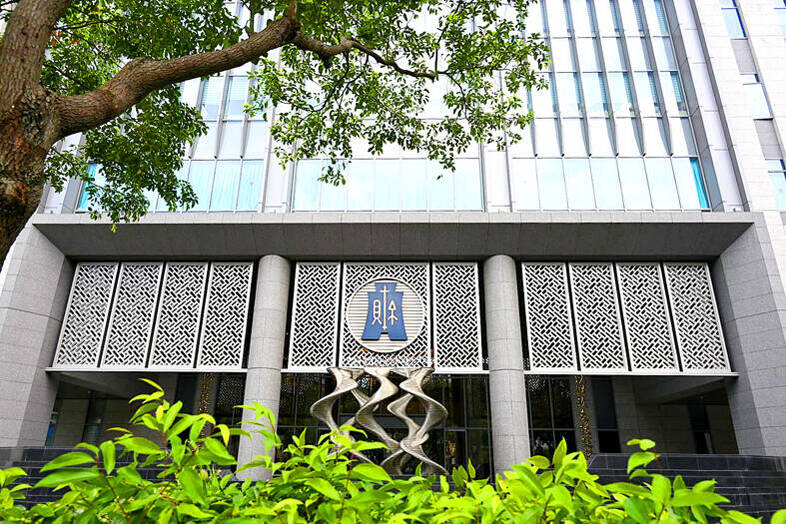Leaked documents related to customs clearance procedures for vice president-elect Hsiao Bi-khim (蕭美琴) that have been circulating on the Internet appear to be an attempt to manipulate public opinion against the government, a source said on Sunday.
A post on online platform Baoliao Commune (爆料公社) on Sunday showed documents it said were evidence that Hsiao had smuggled alcohol through customs with the assistance of the Ministry of Foreign Affairs, and said that the documents were part of a 4GB data dump of confidential material acquired by hackers.
In a rebuttal, the source said that they were not confidential documents, but rather unclassified internal communications between the Ministry of Foreign Affairs, the National Treasury Administration and Keelung Customs Service.

Photo: Chang Chia-ming, Taipei Times
The documents, which were dated March 15, were part of regular customs procedures, the source said, adding that Hsiao had applied for exemption from inspection of 23 bottles of wine for personal use, which was in accordance with regulations.
The wine, along with other personal items, were shipped by sea by Green Van from the US where Hsiao was previously stationed as Taiwan’s representative, the documents showed.
One of the documents shows a reply from the Ministry of Finance to the Ministry of Foreign Affairs, saying: “The request of Hsiao Bi-khim, former ambassador to the United States, for exemptions from a tobacco and alcohol import license, and exemption from inspection of imported alcohol items has been approved,” as long as the items are not used for any commercial purpose, which would constitute illegal alcohol sales.
When diplomats stationed abroad return to Taiwan they can apply for exemptions from customs duties on items brought back for personal use, the source said.
“The information on the documents was clear and the procedures were legal, but there should be an investigation into how the documents were leaked to begin with,” the source said, questioning the intent and motive of whoever leaked the documents.
“What is even more bizarre is that as soon as the documents appeared online, an anonymous user immediately posted to the Baoliao Commune making accusations of corruption,” the source said.
“This is obviously a state-level organized attack to influence public opinion,” the source said.
The post appeared similar to one made last year alleging that the DPP was putting thousands of people under surveillance, the source said, adding that both posts were political in nature and aimed at manipulating public opinion.

Taiwan is stepping up plans to create self-sufficient supply chains for combat drones and increase foreign orders from the US to counter China’s numerical superiority, a defense official said on Saturday. Commenting on condition of anonymity, the official said the nation’s armed forces are in agreement with US Admiral Samuel Paparo’s assessment that Taiwan’s military must be prepared to turn the nation’s waters into a “hellscape” for the Chinese People’s Liberation Army (PLA). Paparo, the commander of the US Indo-Pacific Command, reiterated the concept during a Congressional hearing in Washington on Wednesday. He first coined the term in a security conference last

Prosecutors today declined to say who was questioned regarding alleged forgery on petitions to recall Democratic Progressive Party (DPP) legislators, after Chinese-language media earlier reported that members of the Chinese Nationalist Party (KMT) Youth League were brought in for questioning. The Ministry of Justice Investigation Bureau confirmed that two people had been questioned, but did not disclose any further information about the ongoing investigation. KMT Youth League members Lee Hsiao-liang (李孝亮) and Liu Szu-yin (劉思吟) — who are leading the effort to recall DPP caucus chief executive Rosalia Wu (吳思瑤) and Legislator Wu Pei-yi (吳沛憶) — both posted on Facebook saying: “I

The Ministry of Economic Affairs has fined Taobao NT$1.2 million (US$36,912) for advertisements that exceed its approved business scope, requiring the Chinese e-commerce platform to make corrections in the first half of this year or its license may be revoked. Lawmakers have called for stricter enforcement of Chinese e-commerce platforms and measures to prevent China from laundering its goods through Taiwan in response to US President Donald Trump’s heavy tariffs on China. The Legislative Yuan’s Finance Committee met today to discuss policies to prevent China from dumping goods in Taiwan, inviting government agencies to report. Democratic Progressive Party Legislator Kuo Kuo-wen (郭國文) said

The Ministry of Economic Affairs has fined Taobao NT$1.2 million (US$36,900) for advertisements that exceeded its approved business scope and ordered the Chinese e-commerce platform to make corrections in the first half of this year or its license would be revoked. Lawmakers have called for stricter supervision of Chinese e-commerce platforms and more stringent measures to prevent China from laundering its goods through Taiwan as US President Donald Trump’s administration cracks down on origin laundering. The legislature’s Finance Committee yesterday met to discuss policies to prevent China from dumping goods in Taiwan, inviting government agencies to report on the matter. Democratic Progressive Party